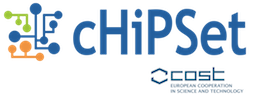Short-Term Scientific Missions (STSMs)
STSMs are primarily intended for PhD students and ESR/young researchers to visit other research groups in order to acquire new expertise, to contribute their expertise to particular projects, and to exchange ideas within participating institutions. STSMs will help PhD students and early-stage researchers to develop contacts and collaborators. STMSs will be organized as short visits, typically of few weeks, but exceptionally of longer duration, between participating sites.
The following table shows the scenarios available to eligible STSM applicants:
|
Home Institution |
Host Institution |
|
From a Participating COST Country |
To another Participating COST Country |
|
To an approved NNC institution |
|
|
To an approved IPC institution |
|
|
To an approved EC / EU |
|
|
From an approved NNC institution |
To a Participating COST Country |
|
From an approved European RTD Organisation |
To a Participating COST Country |
MC: Action Management Committee
NNC : Near Neighbour Country
IPC : International Partner Country
EC: European Commission
EU: European Union
European RTD Organisation : European research and Development Organisation
The evaluation of STSM applications is performed by the MC. Tha Action Chair (or Vice Chair if the Action Chair is affiliated of the Grant Holder Institution) or rhe appointed STSM Coordinator / Commitee can assume the responsibility if the MC formally gives them the mandate to act on their behalf. The evaluation criteria defined by the MC should be communicated in advance to all potential applicants.
cHiPSeT will organize about 30 STSMs overall (about 10 STSMs per year)
STSM Coordinator: Juan Carlos Burguillo-Rial, University of Vigo, Spain
 Juan C. Burguillo-Rial received the M.Sc. degree in Telecommunication Engineering in 1995, and the Ph.D. degree in Telematics in 2001; both at the University of Vigo, Spain. He is currently an associate professor at the Department of Telematic Engineering at the same university. From 2004 to 2006 he was Quality responsible at the Telecommunications School, and from 2005 to 2009 vice-Dean for International Relations. In October 2010, he received a Medal for the Merit Order, from the Ministry of Interior affairs, for supporting the Spanish Security Forces in the fight against childhood crime in the Internet. He has directed and participated in several R&D projects in the areas of Telematics and Computer Science in national and international calls, and has published more than one hundred papers in international refereed journals and conference proceedings. He is regular reviewer of several international conferences and journals including the Journal of Autonomous Agents and Multi-agent Systems, Computers and Education, Engineering Applications of Artificial Intelligence, Computers and Mathematics with Applications, and the Journal of Network and Computer Applications among others. His research interests include intelligent agents, multi-agent systems, game theory and evolutionary algorithms applied to optimization.
Juan C. Burguillo-Rial received the M.Sc. degree in Telecommunication Engineering in 1995, and the Ph.D. degree in Telematics in 2001; both at the University of Vigo, Spain. He is currently an associate professor at the Department of Telematic Engineering at the same university. From 2004 to 2006 he was Quality responsible at the Telecommunications School, and from 2005 to 2009 vice-Dean for International Relations. In October 2010, he received a Medal for the Merit Order, from the Ministry of Interior affairs, for supporting the Spanish Security Forces in the fight against childhood crime in the Internet. He has directed and participated in several R&D projects in the areas of Telematics and Computer Science in national and international calls, and has published more than one hundred papers in international refereed journals and conference proceedings. He is regular reviewer of several international conferences and journals including the Journal of Autonomous Agents and Multi-agent Systems, Computers and Education, Engineering Applications of Artificial Intelligence, Computers and Mathematics with Applications, and the Journal of Network and Computer Applications among others. His research interests include intelligent agents, multi-agent systems, game theory and evolutionary algorithms applied to optimization.